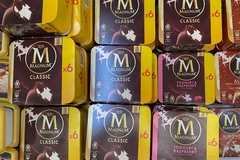
- Industry news
Industry news
- Category news
Category news
- Reports
- Key trends
- Multimedia
- Journal
- Events
- Suppliers
- Home
- Industry news
Industry news
- Category news
Category news
- Reports
- Key trends
- Multimedia
- Events
- Suppliers
Behind The Brands Campaign: Improving Social Sustainability for the Food and Drink Industry
20 Apr 2016

20 Apr 2016 --- Ten of the world’s biggest food and beverage companies battle to improve their social sustainability through the Behind the Brands campaign and nine of the “Big 10” global food and beverage companies have improved their ratings by at least 10 percent in three years since Oxfam began keeping score.
Oxfam highlighted the major strides most of them have made to improve their policies on land rights, agricultural greenhouse gas emissions and gender equality in company supply chains. Kellogg (up 30 percent) and Unilever (up 26 percent) made the most progress across all themes since the campaign began.

More than 700,000 Behind the Brands actions have pushed the “Big 10” to take significant steps to address specific policy weaknesses identified by Oxfam’s public campaigning – equality for women, land rights and tackling greenhouse gas emissions produced in agricultural supply chains. The companies improved most markedly on those issues, by an average of 24 percent, 37 percent and 32 percent respectively.
“These food industry giants all demonstrated that they do listen to consumers by making some bold policy commitments. We hope this will inspire others to follow suit,” says Behind the Brands campaign manager, Monique van Zijl. “Now it’s crucial for the ‘Big 10’ to substantially change their business models to make good on these promises, and challenge their suppliers to ensure that small-scale producers get fair and livable wages.”
The Behind the Brands scorecard compares the sustainability commitments of the “Big 10” against each other, focusing on seven key themes: land, women, farmers, workers, climate, transparency and water. Company scores improved the least on workers followed by water and transparency.
Speaking with FoodIngredientsFirst, van Zijl explains: "Behind the Brands aims to change the policies and practices of some of the world's biggest food and beverage companies in relation to their agricultural commodity supply chains, to help bring about a world where everyone always has enough to eat. The "Big 10" food and beverage companies – that together make $1 billion-a-day – are failing millions of people in developing countries who supply land, labor, water and commodities needed to make their products."
“The ‘Big 10’ could make a huge impact in helping fight poverty by ensuring the prices they pay for commodities allow for a living wage for the workers in their supply chains,” says van Zijl.
Three years ago, when Oxfam kicked off the Behind the Brands campaign, the bulk of the “Big 10” were lagging in their approach to social responsibility and sustainability in their supply chains. In February 2013, seven of the ten companies had overall scores of 31 percent or below. In April 2016, no company scores below 36 percent.
"The past three years have seen companies in the food and beverage sector take on progressive social sustainability commitments," says van Zijl, "More than anything we believe that to really change the future of food and accelerate the transformation towards a truly just and sustainable food system, companies need to fundamentally re-write their business models to ensure that both much more power and value reaches small scale producers and agricultural workers.
Throughout the campaign, Unilever and Nestlé have led the pack scoring high on climate change policies. Unilever achieved the top spot from Nestlé after two years.
Describing the ranking as “an honour”, Unilever CEO Paul Polman said the results “reflect the progress we are making to reduce our environmental footprint while increasing our social impact, guided by the Unilever Sustainable Living Plan”.
He added: “The FMCG industry as a whole has made some strong commitments in recent years, notably in terms of value chain approach.
“However, we must recognise that there is still much more to be done. This scorecard and other assessments are important reminders that we all have a responsibility to deliver more and faster for farmers, communities and societies around the world. The Sustainable Development Goals and Paris Agreement have provided us with a global framework towards progress, but can only be achieved through accelerated partnerships and collective action, to drive truly transformative change at scale,” said Polman.
Coca-Cola, with strong policies on land rights, remains third at 57 percent, followed by Kellogg at 53 percent. ABF, with weak commitments on farmers, gender and water, was in last place in 2013 and remains one of the poorest performers in 2016, with 36 percent, despite improvements by some of its subsidiaries – notably Illovo Sugar on land. Danone is the other poorest performer, despite significant commitments on climate.
“Despite some strong progress over the past three years, the ‘Big 10’ still have a lot of work to do. Given the inequalities and injustices in the food chain that leave millions of people at risk of being food insecure, especially small-scale producers, the ‘Big 10’ must use their power to transform how food is produced, traded and processed,” claims van Zijl. “Giving more power and economic value to farmers, workers and food producing communities will not only be good for all of us, but also for the companies’ bottom lines in the long run.”
Companies are finally addressing climate change, land rights and the role of women in supply chains and are waking up to the need to build more economically resilient agricultural supply chains. However they cannot tackle these issues alone, according to Behind the Brands campaign’s recent paper, “The Journey to Sustainable Food”. The “Big 10” are Associated British Foods (ABF), Coca-Cola, Danone, General Mills, Kellogg, Mars, Mondelez, Nestlé, PepsiCo and Unilever.
by Elizabeth Kenward
All content and features on this website are copyrighted with all rights reserved. The full details can be found in our privacy statement
Subscribe to our newsletters
By continuing to browse our site you agree to our Privacy Statement










